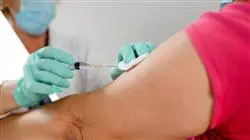University certificate
The world's largest faculty of psychology”
Introduction to the Program
You will identify the main risk factors for relapse in EDs and employ optimal therapies”

In the context of eating disorders, it is essential for psychologists to address meal avoidance through assertiveness. Likewise, health professionals should delve into the specific cases of their patients in order to apply the most appropriate strategies. Among them, exposure therapy stands out: it is based on exposing patients to the source of their anxiety, either through an object or a distressing thought. In this way, users learn techniques to confront their fears and control the thoughts that produce feelings of distress. In this regard, it is essential for specialists to master tactics for managing medical comorbidities during the treatment of EDs.
To respond to this need, TECH implements a program where students will update their knowledge in the diagnosis of EDs. The syllabus will allow students to acquire a transdiagnostic point of view, which will allow them to understand the underlying mechanisms of the disorders.
In this way, the program will address the most effective treatments to treat common pathologies such as vigorexia or orthorexia. Likewise, the program will delve into interdisciplinary collaboration in treatments: psychologists, physicians and nutritionists must work together to ensure the well-being of their patients. Finally, the academic itinerary will offer strategies for fall prevention and wellness maintenance.
On the other hand, TECH focuses on efficiency. Therefore, it relies on the Relearning system to provide vital support to the professional. This method consists of repeating key concepts throughout the program, thus allowing graduates to acquire the necessary knowledge in TCA without the extra effort of memorizing. In addition, the virtual platform will be available 24 hours a day, 365 days a year. Therefore, it will make it easier for the student to log in, download the syllabus and test it anywhere in the world.
You will apply techniques designed to actively engage families and bring about changes in dynamics"
This Postgraduate certificate in Comprehensive Multidisciplinary Transdiagnostic Treatment contains the most complete and up-to-date program on the market. The most important features include:
- The development of practical cases presented by experts in Psychology, Nutrition, Dietetics, etc…
- The graphic, schematic, and practical contents with which they are created, provide scientific and practical information on the disciplines that are essential for professional practice
- Practical exercises where self-assessment can be used to improve learning
- Its special emphasis on innovative methodologies
- Theoretical lessons, questions to the expert, debate forums on controversial topics, and individual reflection assignments
- Content that is accessible from any fixed or portable device with an Internet connection
Address the most effective procedures for treating feeding resistance with this program”
The program’s teaching staff includes professionals from the industry who contribute their work experience to this program, as well as renowned specialists from leading societies and prestigious universities.
The multimedia content, developed with the latest educational technology, will provide the professional with situated and contextual learning, i.e., a simulated environment that will provide immersive education programmed to learn in real situations.
This program is designed around Problem-Based Learning, whereby the professional must try to solve the different professional practice situations that arise during the academic year For this purpose, the student will be assisted by an innovative interactive video system created by renowned and experienced experts.
You will master the most advanced scaling tools to determine the severity of pathologies"

You will learn valuable lessons through real cases in simulated learning environments"
Why study at TECH?
TECH is the world’s largest online university. With an impressive catalog of more than 14,000 university programs available in 11 languages, it is positioned as a leader in employability, with a 99% job placement rate. In addition, it relies on an enormous faculty of more than 6,000 professors of the highest international renown.

Study at the world's largest online university and guarantee your professional success. The future starts at TECH”
The world’s best online university according to FORBES
The prestigious Forbes magazine, specialized in business and finance, has highlighted TECH as “the world's best online university” This is what they have recently stated in an article in their digital edition in which they echo the success story of this institution, “thanks to the academic offer it provides, the selection of its teaching staff, and an innovative learning method aimed at educating the professionals of the future”
A revolutionary study method, a cutting-edge faculty and a practical focus: the key to TECH's success.
The most complete study plans on the university scene
TECH offers the most complete study plans on the university scene, with syllabuses that cover fundamental concepts and, at the same time, the main scientific advances in their specific scientific areas. In addition, these programs are continuously being updated to guarantee students the academic vanguard and the most in-demand professional skills. In this way, the university's qualifications provide its graduates with a significant advantage to propel their careers to success.
TECH offers the most comprehensive and intensive study plans on the current university scene.
A world-class teaching staff
TECH's teaching staff is made up of more than 6,000 professors with the highest international recognition. Professors, researchers and top executives of multinational companies, including Isaiah Covington, performance coach of the Boston Celtics; Magda Romanska, principal investigator at Harvard MetaLAB; Ignacio Wistumba, chairman of the department of translational molecular pathology at MD Anderson Cancer Center; and D.W. Pine, creative director of TIME magazine, among others.
Internationally renowned experts, specialized in different branches of Health, Technology, Communication and Business, form part of the TECH faculty.
A unique learning method
TECH is the first university to use Relearning in all its programs. It is the best online learning methodology, accredited with international teaching quality certifications, provided by prestigious educational agencies. In addition, this disruptive educational model is complemented with the “Case Method”, thereby setting up a unique online teaching strategy. Innovative teaching resources are also implemented, including detailed videos, infographics and interactive summaries.
TECH combines Relearning and the Case Method in all its university programs to guarantee excellent theoretical and practical learning, studying whenever and wherever you want.
The world's largest online university
TECH is the world’s largest online university. We are the largest educational institution, with the best and widest online educational catalog, one hundred percent online and covering the vast majority of areas of knowledge. We offer a large selection of our own degrees and accredited online undergraduate and postgraduate degrees. In total, more than 14,000 university degrees, in eleven different languages, make us the largest educational largest in the world.
TECH has the world's most extensive catalog of academic and official programs, available in more than 11 languages.
Google Premier Partner
The American technology giant has awarded TECH the Google Google Premier Partner badge. This award, which is only available to 3% of the world's companies, highlights the efficient, flexible and tailored experience that this university provides to students. The recognition as a Google Premier Partner not only accredits the maximum rigor, performance and investment in TECH's digital infrastructures, but also places this university as one of the world's leading technology companies.
Google has positioned TECH in the top 3% of the world's most important technology companies by awarding it its Google Premier Partner badge.
The official online university of the NBA
TECH is the official online university of the NBA. Thanks to our agreement with the biggest league in basketball, we offer our students exclusive university programs, as well as a wide variety of educational resources focused on the business of the league and other areas of the sports industry. Each program is made up of a uniquely designed syllabus and features exceptional guest hosts: professionals with a distinguished sports background who will offer their expertise on the most relevant topics.
TECH has been selected by the NBA, the world's top basketball league, as its official online university.
The top-rated university by its students
Students have positioned TECH as the world's top-rated university on the main review websites, with a highest rating of 4.9 out of 5, obtained from more than 1,000 reviews. These results consolidate TECH as the benchmark university institution at an international level, reflecting the excellence and positive impact of its educational model.” reflecting the excellence and positive impact of its educational model.”
TECH is the world’s top-rated university by its students.
Leaders in employability
TECH has managed to become the leading university in employability. 99% of its students obtain jobs in the academic field they have studied, within one year of completing any of the university's programs. A similar number achieve immediate career enhancement. All this thanks to a study methodology that bases its effectiveness on the acquisition of practical skills, which are absolutely necessary for professional development.
99% of TECH graduates find a job within a year of completing their studies.
Postgraduate Certificate in Transdiagnostic Multidisciplinary Integrated Treatment
The transdiagnostic approach to mental health treatment has emerged as a revolution in the way we approach psychopathological diversity. If you want to gain the knowledge and skills necessary to perform in this field, you've come to the right place. At TECH Global University you will find the most complete Postgraduate Certificate in Transdiagnostic Multidisciplinary Integrated Treatment that will help you achieve your goals. Start your academic journey in online modality, exploring the fundamental principles of the transdiagnostic approach. This module will lay the foundation for understanding how this approach breaks down traditional diagnostic barriers by focusing on the underlying mechanisms shared among different mental disorders. In addition, you will learn how to conduct comprehensive assessments that transcend conventional diagnostic categories. This module focuses on identifying transdiagnostic patterns, allowing you to precisely customize interventions and tailor them to the unique needs of each individual.
The module is designed to help you identify transdiagnostic patterns, allowing you to precisely tailor interventions to meet the unique needs of each individual.
Delve into comprehensive multidisciplinary transdiagnostic treatment
In the program, you will find complete flexibility in your schedule, as well as innovative methodologies that make learning a unique and pleasantly effective experience to aspire to a better professional future. As you advance in your training, you will explore therapeutic strategies that effectively address common aspects of mental disorders. From cognitive-behavioral interventions to humanistic approaches, this module will enable you to apply a spectrum of techniques tailored to the diversity of clinical presentations. You will stay on the cutting edge by integrating current and technological practices in treatment. This module focuses on the utilization of digital tools and online therapies to enhance the accessibility and effectiveness of transdiagnostic treatment. At the conclusion of this Postgraduate Certificate, you will have developed advanced competencies in comprehensive multidisciplinary transdiagnostic treatment. Join us and lead the way towards more inclusive and efficient care in the mental health field. Enroll now and make a difference in the lives of those who seek a therapeutic approach tailored to their uniqueness!







